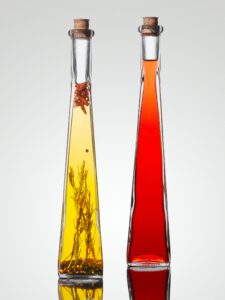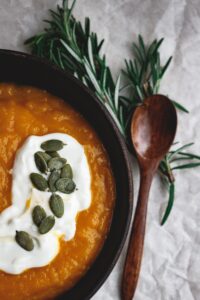
Photo by Buffy Rhoades
Free books, movies, magazines…I mean, come on…the library is amazing! But did you know you can also borrow a food strainer, pressure canner, boiling water canner, or a food dehydrator from the library?
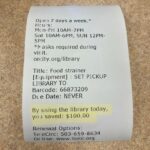
Photo from Buffy Rhoades
What is The Library of Things?
A Library of Things is a collection of items other than books/dvds, that you can borrow from the library. It supports a “sharing economy”, allowing us to try before we buy, and reduces waste. Thank you Clackamas County Office of Sustainability for initiating this program! If folks can borrow instead of buying, we’re not only saving money, but also reducing our impact on the planet.
How Did OSU Extension Get Involved?
Sometimes all you have to do is ask. 🙂 This was a project near and dear to our heart, but lacked a sustainable system. A perfectly timed phone call to the Oregon City Public Library led to series of meetings and a partnership was born. By September 2019, our program partnered with five of the nine libraries participating in the local Library of Things project. We donated surplus food preservation equipment and compiled printed and digital food preservation resources.

The Library of Things program was paused during library closures in 2020.
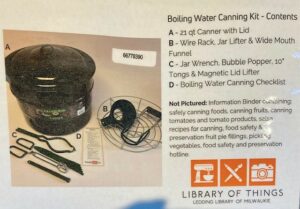
The public came back strong in 2021, borrowing pressure canners, food dehydrators, strainers, and boiling water canning kits. By the way, dehydrators are hugely popular in Milwaukie! (I wonder if the Master Food Preserver presence at the Milwaukie Farmer’s market had anything to do with those numbers?) Borrowers shared their success stories with library employees, encouraging each other to try new things. The best part, to me, is that our educational material is still out there, always free, supporting a system of lifelong curiosity and learning.
“Maintenance? What maintenance?”
Testing gauges and gaskets is an important part of scheduled maintenance. The dial gauge of a pressure canner needs to be tested, at least, annually. If a canner is new to you, the dial gauge needs to be tested before using. If you drop the lid, get it re-tested. As part of a good Spring Into Canning practice, this is a perfect time to do it. Contact your local Extension office and schedule your Free appointment.
Weighted gauges- what are they, and how do I use them?
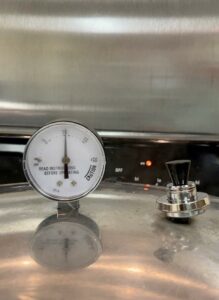
Photo by Buffy Rhoades
Each library’s pressure canner kit contains a three-piece weighted gauge. Stay tuned for a new Clackamas County FCH YouTube video sharing how to convert a dial gauge canner to a weighted gauge and why this may be the perfect choice for you.
In the meantime, my friends, keep building each other up by celebrating one another’s successes, stay curious, and above all, be kind.
If you haven’t already, please subscribe, comment, and share with your peeps. We appreciate the comments.
Buffy Rhoades| preserver. forager. gardener. volunteer turned program assistant. a real busy beaver
![]()
![]()
![]() Healthy Together Newsletter Website
Healthy Together Newsletter Website


